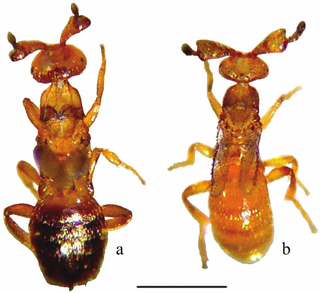
The Eulophidae is a large family of hymenopteran insects, with over 4,300 described species in some 300 genera. The family includes the genus Elasmus, which used to be treated as a separate family, "Elasmidae", and is now treated as a subfamily of Eulophidae. These minute insects are challenging to study, as they deteriorate rapidly after death unless extreme care is taken, making identification of most museum specimens difficult. The larvae of very few species feed on plants, but the majority are primary parasitoids on a huge range of arthropods at all stages of development. They are exceptional in that they are one of two hymenopteran families with some species that are known to parasitize thrips. Eulophids are found throughout the world in virtually all habitats.
Achrysocharoides is a genus of hymenopteran insects of the family Eulophidae.
Aprostoporoides is a small Indomalayan genus of hymenopteran insects of the family Eulophidae which was described in 2004 with two newly described species from Kerala.
Asecodes is a genus of hymenopteran insects of the family Eulophidae. They are endoparasitoids of Galerucella larvae.
Baeoentedon is a genus of hymenopteran insects of the family Eulophidae, they are parasitoids of whitefly from the family Aleyrodidae which are found on trees of the genus Ficus. They have been recorded from Australia, China, India, Indonesia and Florida. A fifth species, Baeoentodon farazi, was described from Karnataka, India, in 2017.

Chrysocharis is a genus of hymenopteran insects of the family Eulophidae. Species in this genus are parasitoids as larvae, with hosts of multiple species being Agromyzidae flies.
Emersonella is a genus of hymenopteran insects of the family Eulophidae. Several species are known to be phoretic parasitoids of female tortoise beetles, laying their eggs in the eggs of the beetle host.
Eprhopalotus is a genus of hymenopteran insects of the family Eulophidae. Their distribution varies between species but ranges from Costa Rica, Mexico to Texas. There are currently 5 species of Eprhopalotus:
Goetheana is a genus of hymenopteran insects of the family Eulophidae. As a parasitoid of thrips, this wasp is used in biological pest control.

Horismenus is a genus of hymenopteran insects of the family Eulophidae occurring primarily in the Americas. As of 2015 over 400 species in the genus have been described. Horismenus species are often described as parasitizing other insects.

Leptocybe invasa, the blue gum chalcid wasp or eucalyptus gall wasp, is a chalcid wasp which is the only species in the monotypic genus Leptocybe in the subfamily Tetrastichinae, of the family Eulophidae. It is a gall wasp which causes the formation of galls on a number of species of Eucalyptus, it was described in 2004 after galls were found in river red gums in the Mediterranean and Middle East and has since been found to be a widespread species where its host trees are planted. It is indigenous to Australia.

Melittobia is a genus of hymenopteran insects of the family Eulophidae.
Microdonophagus is a genus of hymenopteran insects of the family Eulophidae.

Minotetrastichus is a genus of hymenopteran insects of the family Eulophidae. They are parasites of leaf-mining Lepidoptera, Coleoptera, and Hymenoptera.
Notanisomorphella is a genus of hymenopteran insects of the family Eulophidae. They are parasitoids with hosts including Coleophoridae, leaf mining beetles, and spider eggs.

Omphale is a genus of hymenopteran insects of the family Eulophidae. It has cosmopolitan distribution.

Pediobius is a genus of hymenopteran insects of the chalcid wasp family Eulophidae. Like their relatives, the larvae of these diminutive wasps are parasitoids of various arthropods. Some Pediobius are used in biological pest control.

Pnigalio is a genus of hymenopteran insects of the family Eulophidae. Nearly 100 species have been described of which about half may be valid. All species are parasites of other insects. Their biology varies widely among those species that have been studied. Some are ectoparasites, others parasitoid, and still others are hyperparasitoids and their hosts include beetles, flies, hymenopteran and lepidopterans.

Quadrastichus is a genus of hymenopteran insects of the family Eulophidae.
Stenomesius is a genus of hymenopteran insects of the family Eulophidae.









